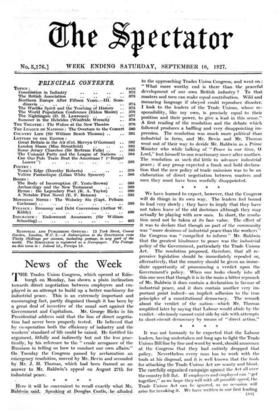We have learned to expect, however, that the Congress will
do things in its own way. The leaders feel bound to lead very slowly ; they have to imply that they have not taken leave of the old doctrines although they may actually be playing with new ones. In short, the resolu- tion need not be taken at its face value. The effect of it was to declare that though no part of the community was "more desirous of industrial peace than the workers" the Congress was "compelled to inform" Mr. Baldwin that the greatest hindrance to peace was the industrial policy of the Government, particularly the Trade Unions Act. The resolution proposed, therefore, that all re- pressive legislation should be immediately repealed or, alternatively, that the country should be given an imme- diate opportunity of pronouncing a verdict upon the Government's policy. When one looks closely into all this one sees that though it is in the main a bitter reproach of Mr. Baldwin it does contain a declaration in favour of industrial peace, and it does contain another very im- portant point indeed—an implicit adhesion to the true principles of a constitutional democracy. The remark about the verdict of the nation—which Mr. Thomas amplified later by saying that Labour would abide by the verdict—obviously cannot exist side by side with attempts to short-circuit democracy by means of "direct action."
• *






































